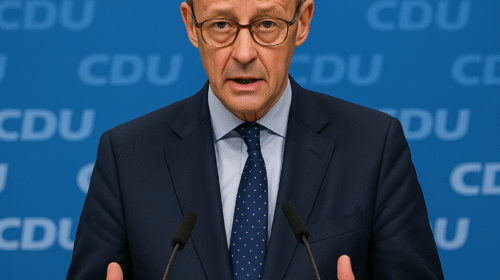Friedrich Merz: Germany’s Conservative Veteran Navigating a New Political Era
Friedrich Merz is one of the most controversial and intriguing personalities in the constantly changing world of German politics. Merz, a former member of the Christian Democratic Union (CDU), has returned to the centre of German politics after a remarkable political comeback in recent years. In light of Germany’s ongoing economic difficulties, international conflicts, and changing public opinion, Merz’s position as head of the CDU party is being scrutinised more than ever.
A Political Comeback Decades in the Making
The tale of Friedrich Merz is one of perseverance and creativity. As he swiftly advanced through the CDU ranks in the 1990s, his early political career took off. Merz, who rose to prominence in the Bundestag and was even considered as a possible successor to then-Chancellor Helmut Kohl, was well-known for his keen intellect and economic conservatism. However, his ascent was cut short when Angela Merkel took the reins of the party, leading Merz to step away from politics in 2009.
A prosperous period in the private sector ensued. After practicing corporate law, Merz rose to the position of Chairman of the Supervisory Board of BlackRock Germany, one of the biggest asset managers in the world. His technocratic approach to policy, especially in the areas of finance and economic development, was influenced by his business background.
However, it appears that politics ran in his family. Friedrich Merz is one of the most controversial , In 2018, Merz rejoined the CDU, presenting himself as the conservative counterpart of Merkel’s moderate leadership. In 2022, following two unsuccessful attempts, he was elected party leader.
Steering the CDU Post-Merkel
It’s no easy task to lead Germany’s biggest opposition party, particularly in the wake of Angela Merkel’s 16-year Chancellorship. In addition to trying to forge his own personality, Merz has worked to bring the CDU’s disparate ideological groups back together. He takes a more conventional approach, emphasising law and order, economic restraint, and a more robust immigration policy.
Merz must, however, perform a careful balancing act. With growing support for the far-right Alternative für Deutschland (AfD) in some areas, especially in the east, Germany’s political landscape is more divided than ever. Merz has walked a tightrope between appealing to disaffected conservative voters and distancing the CDU from the extreme right.
He sparked controversy in 2023 by implying that the CDU might think about collaborating with the AfD at the municipal level. He swiftly withdrew this suggestion in response to criticism from both the public and members of his own party. The event made clear how difficult it is for Merz to navigate the divisive political environment without alienating the centrist supporters of the CDU.
Focus on Economy and Security
Merz, who has a banking background, has made economic stability a major focus of his leadership. He has been an outspoken critic of how the government coalition has handled energy pricing, inflation, and the switch to renewable energy. Merz contends that the policies of the administration run the risk of jeopardising Germany’s middle-class prosperity and economic competitiveness.
He has also underlined the significance of national and European security. Merz has advocated for a more robust foreign policy and higher military spending in line with NATO pledges as geopolitical tensions with Russia over Ukraine persist.
Supporters view him as a steady hand who can bring order and direction back to the CDU, particularly in the run-up to the federal elections in 2025, while some opponents claim his ideas lack a new vision.
The Road Ahead
In the upcoming year, Friedrich Merz’s leadership will be put to the test. He needs to mobilise support from a wide range of voters, offer a strong alternative to Chancellor Olaf Scholz’s coalition, and stop the AfD from invading the country in the upcoming 2025 election.
It remains to be seen if he can successfully modernise the CDU while adhering to its conservative foundation. However, it is certain that Merz has once again solidified his position as a key player in German politics. His blend of political tenacity, commercial savvy, and ideological clarity may be just what the CDU needs, or it may prove to be a liability at a time when adaptability and forward-thinking are more and more important.
Friedrich Merz is definitely not finished yet.
